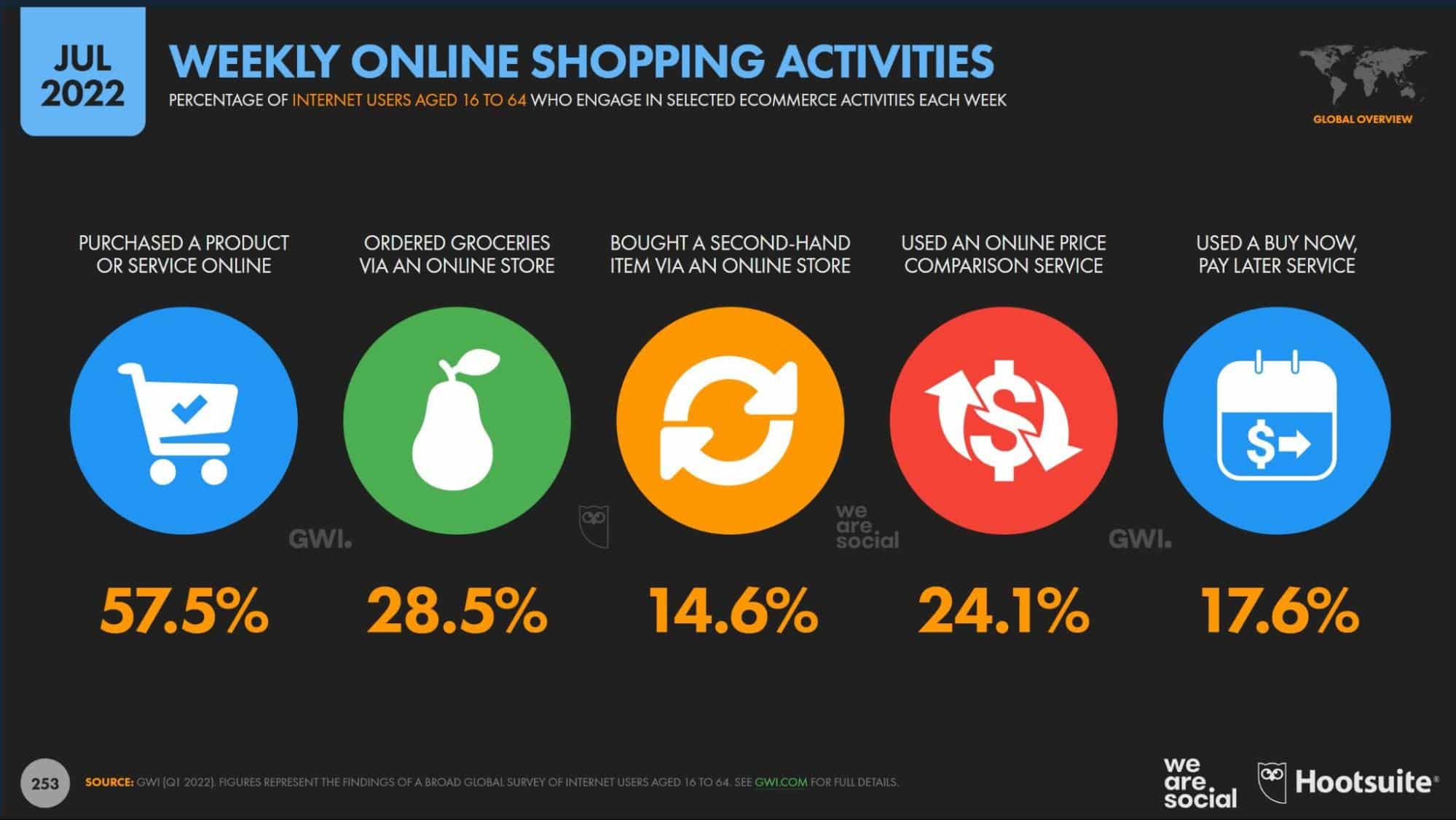marketing digital e commerce

Digital Marketing
Digital marketing has revolutionized the way businesses operate in the modern world. With the rapid growth of e-commerce, understanding digital marketing has become essential for success.
1. What is digital marketing?
Digital marketing refers to the use of digital channels such as websites, social media, email, search engines, and mobile apps to promote products or services. It involves various strategies like search engine optimization (SEO), content marketing, social media marketing, email marketing, and pay-per-click (PPC) advertising.
2. Importance of digital marketing in today’s e-commerce landscape
In today’s competitive e-commerce landscape, digital marketing plays a crucial role in helping businesses thrive. Here are some reasons why digital marketing is important:
- Increased reach: Digital marketing allows businesses to reach a wider audience compared to traditional marketing methods. With the internet being accessible to billions of people around the world, you can target potential customers from different regions.
- Better targeting: Digital marketing provides highly targeted advertising options, allowing businesses to focus their efforts on specific demographics, interests, and behaviors. This helps in maximizing the effectiveness of marketing campaigns and achieving higher conversion rates.
- Measurable results: Unlike traditional marketing, digital marketing provides real-time data and analytics that allow businesses to track and measure the success of their campaigns. This enables businesses to make data-driven decisions and optimize their marketing strategies for better results.
- Cost-effective: Digital marketing is generally more cost-effective than traditional marketing methods. Small and medium-sized businesses can leverage digital platforms to compete with larger competitors on a more level playing field.
By embracing digital marketing, businesses can reach their target audience more effectively, increase brand visibility, and drive more conversions in the dynamic world of e-commerce.

Strategies for Successful Digital Marketing
When it comes to marketing in the digital space, it’s crucial to have a well-defined plan in place. Here are some key strategies to consider:
1. Developing a digital marketing plan
Before diving into digital marketing tactics, it’s important to outline a comprehensive plan that aligns with your business goals. This plan should include target audience analysis, competitor research, and clear objectives for each digital marketing channel.
2. SEO (Search Engine Optimization) techniques for increased online visibility
Search Engine Optimization (SEO) plays a critical role in improving your website’s visibility in search engine results. This involves optimizing your website’s content, meta tags, and ensuring a user-friendly experience. By implementing effective SEO techniques, you can drive organic traffic to your website and improve your online presence.
3. PPC (Pay-Per-Click) advertising and its benefits
PPC advertising allows you to display targeted ads on search engines and other digital platforms. With PPC, you only pay when someone clicks on your ad, making it a cost-effective way to reach your target audience. By carefully selecting keywords, optimizing ad campaigns, and monitoring performance, you can drive qualified traffic to your website and increase conversions.
4. Social media marketing strategies for e-commerce businesses
Social media platforms provide excellent opportunities for e-commerce businesses to connect with their target audience. By creating engaging content, utilizing influencers, and running targeted ads, you can raise awareness, drive traffic to your website, and generate sales. It’s essential to choose social media channels that align with your target audience and develop a consistent brand presence.
Implementing these digital marketing strategies can help your e-commerce business thrive in the online landscape. By focusing on developing a solid plan, optimizing your website for search engines, utilizing PPC advertising, and leveraging social media, you can effectively reach and engage

Effective E-commerce Website Design
When it comes to marketing your digital e-commerce business, having an effective website design is crucial. Here are some key points to consider:
1. Key elements of a user-friendly e-commerce website
To provide a seamless user experience, your e-commerce website should have clear navigation, intuitive design, and easy-to-use search functionalities. Additionally, product categories, filters, and sorting options can help customers find what they are looking for quickly. Incorporating customer reviews and ratings can build trust and credibility.
2. Importance of responsive web design for mobile optimization
With the increasing use of mobile devices for online shopping, it is essential to have a responsive web design that adapts to different screen sizes. Mobile optimization ensures that your website looks and functions well on smartphones and tablets, allowing customers to browse and make purchases conveniently.
3. Creating compelling product descriptions and visuals
Effective product descriptions should be clear, informative, and highlight the benefits and unique features of your products. Including high-quality visuals, such as images and videos, can showcase your products in an appealing and engaging way, increasing the likelihood of conversions.
4. Implementing effective call-to-action buttons
Strategically placing call-to-action buttons, such as “Buy Now” or “Add to Cart,” throughout your website encourages customers to take action. These buttons should be visually prominent and easy to find. Optimizing their design and placement can significantly improve conversion rates.
By implementing these key elements, you can create a user-friendly e-commerce website that attracts and engages customers, leading to increased sales and business growth.
.jpg)
Email Marketing Campaigns
1. Building an email list and leveraging it for e-commerce success
To achieve e-commerce success, building and leveraging an email list is essential. By capturing email addresses from website visitors and customers, you can establish a direct line of communication. Use lead magnets and incentives to encourage sign-ups and ensure you comply with data protection regulations. With an email list, you can send targeted promotions, exclusive offers, and personalized content to nurture customer relationships and drive sales.
2. Creating engaging and targeted email campaigns
Engaging and targeted email campaigns are crucial for e-commerce success. Segment your email list based on demographics, past purchases, and browsing behavior to send relevant content. Craft attention-grabbing subject lines, personalized messages, and compelling visuals to increase open rates and conversions. Use email automation tools to schedule campaigns, trigger follow-ups, and send personalized recommendations based on customer actions.
3. Personalization and automation in email marketing
Personalization and automation are key drivers of successful email marketing campaigns. Utilize customer data to personalize emails with names, product recommendations, and tailored offers. Implement automation workflows to deliver timely and automated emails based on specific triggers such as abandoned carts, order confirmations, or milestone celebrations. By leveraging personalization and automation, you can deliver a personalized and seamless customer experience.
4. Analyzing email marketing metrics for continuous improvements
To optimize your email marketing campaigns, analyze metrics such as open rates, click-through rates, conversion rates, and unsubscribe rates. Use A/B testing to determine which subject lines, visuals, or call-to-actions perform better. Monitor customer engagement and revenue generated from email campaigns to identify areas for improvement. Continuous analysis and optimization will help you refine your email marketing strategy and drive better results for your e-commerce business.

Content Marketing for E-commerce
When it comes to marketing in the digital realm, content is king! Focusing on content marketing can take your e-commerce business to new heights and help you effectively engage with your target audience.
1. Crafting engaging and valuable content for your target audience
To capture your audience’s attention, it’s crucial to create content that is not only engaging but also adds value to their lives. This can be achieved through informative blog posts, helpful articles, and entertaining videos. By delivering content that resonates with your target audience, you can establish yourself as an authority in your industry and build trust with potential customers.
2. Utilizing blogs, articles, and videos to drive traffic and brand awareness
Blogs, articles, and videos are powerful tools for driving traffic to your e-commerce website and increasing brand awareness. By optimizing your content for search engines and utilizing social media platforms, you can attract a wider audience and generate more leads. Providing valuable information through your content can also entice visitors to explore your products or services, ultimately leading to conversions.
3. Importance of storytelling in content marketing
Storytelling is a key aspect of content marketing that helps humanize your brand and establish an emotional connection with your audience. By weaving compelling narratives into your content, you can engage and captivate your audience, making your brand more relatable and memorable.
4. Content distribution strategies for maximum reach and impact
Creating great content is just the first step; you also need to ensure it reaches your target audience. Utilize various distribution channels, such as social media, email marketing, and influencer collaborations, to expand your content’s reach and maximize its impact. By strategically distributing your content, you can increase brand visibility, attract more potential customers, and drive conversions.
In conclusion, content marketing plays a vital role in the success of an e-commerce business. By crafting engaging and valuable content, optimizing distribution strategies, and utilizing storytelling techniques, you can effectively market your e-commerce brand and drive growth.

In today’s digital age, marketing your e-commerce business is essential for success. One effective strategy is social media advertising.
1. Choosing the right social media platforms for your e-commerce business
When it comes to social media advertising, it’s important to choose the right platforms for your e-commerce business. Here are some considerations to help you make informed decisions:
- Understand your target audience: Research which social media platforms your target audience uses the most. This will ensure that your ads reach the right people.
- Analyze platform demographics: Each social media platform has its own user demographics. Consider the age, gender, location, and interests of the platform’s users to ensure it aligns with your target audience.
- Evaluate ad formats and features: Different social media platforms offer varying ad formats and features. For example, Instagram emphasizes visual content, while Facebook offers detailed targeting options. Choose platforms that support the kind of ads you want to create.
- Budget considerations: Assess your budget to determine which social media platforms are feasible for advertising. Consider the costs associated with running ads on different platforms and prioritize accordingly.
By carefully selecting the right social media platforms for your e-commerce business, you can effectively reach your target audience and maximize your advertising efforts. Remember to regularly analyze and adjust your strategies based on performance metrics to optimize your results and achieve success in the digital marketplace.
Digital marketing for e-commerce is the use of online marketing tactics to reach and convert potential customers into paying customers. It is a broad term that encompasses a variety of strategies, including:
- Search engine optimization (SEO): SEO is the process of optimizing your website and content so that it ranks higher in search engine results pages (SERPs). This can help you to attract more organic traffic to your website.
- Pay-per-click (PPC) advertising: PPC advertising allows you to place ads at the top of SERPs and on other websites. You only pay for these ads when someone clicks on them.
- Social media marketing: Social media marketing can help you to connect with potential customers and promote your products and services.
- Email marketing: Email marketing allows you to stay in touch with potential and existing customers and send them targeted promotional messages.
- Content marketing: Content marketing involves creating and distributing valuable content to attract and engage potential customers.
- Affiliate marketing: Affiliate marketing involves partnering with other businesses to promote each other’s products and services.
When choosing digital marketing tactics for e-commerce, it is important to consider your target audience, your budget, and your business goals. It is also important to track the results of your campaigns so that you can see what is working and what is not.
Here are some tips for successful digital marketing for e-commerce:
- Understand your target audience: What are their needs and wants? Where do they spend their time online? Once you understand your target audience, you can create marketing messages that are more likely to resonate with them.
- Create a strong brand identity: Your brand identity is what sets you apart from your competitors. Make sure your website, marketing materials, and products all reflect your brand identity.
- Offer competitive prices and shipping options: Shoppers are price-sensitive, so it is important to offer competitive prices. You should also offer a variety of shipping options to meet the needs of your customers.
- Make it easy for customers to buy from you: Your website should be easy to navigate and checkout should be quick and easy.
- Provide excellent customer service: Customer service is essential for e-commerce businesses. Make sure that it is easy for customers to contact you and that you respond to their inquiries promptly.
By following these tips, you can create a successful digital marketing strategy for your e-commerce business.
Here are some additional tips for digital marketing for e-commerce in 2023:
- Focus on mobile: More and more people are shopping online from their mobile devices. Make sure your website and online store are optimized for mobile.
- Use video marketing: Video is a great way to engage potential customers and promote your products and services. Consider creating product videos, explainer videos, and testimonial videos.
- Personalize your marketing messages: Shoppers are more likely to respond to marketing messages that are relevant to them. Use your customer data to personalize your marketing messages and offers.
- Use social proof: Social proof is the idea that people are more likely to do something if they see others doing it. Use social proof to your advantage by displaying customer testimonials and social media engagement on your website.
- Run loyalty programs: Loyalty programs can help you to retain customers and encourage them to spend more money with your business. Consider offering a loyalty program that rewards customers for repeat purchases and referrals.
By following these tips, you can create a successful digital marketing strategy for your e-commerce business in 2023 and beyond.
